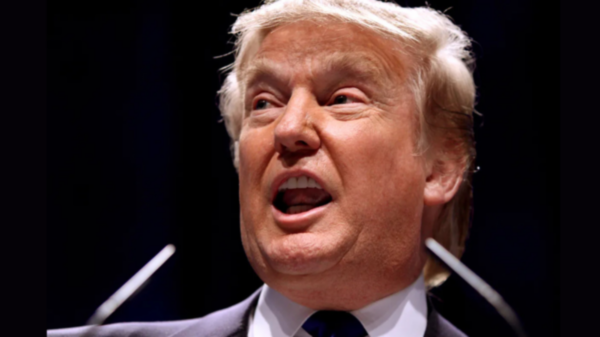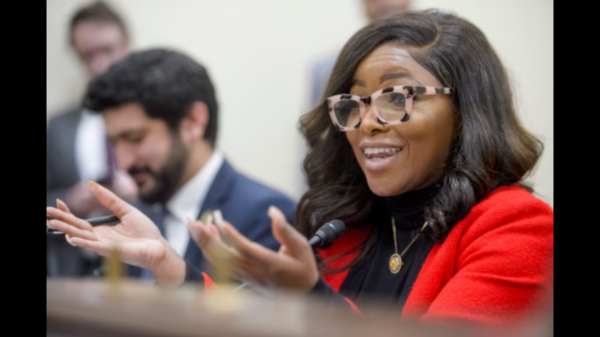By Gromer Jeffers Jr.

Former President Donald Trump is expected to easily win Tuesday’s Texas primary, putting him a significant step closer to sealing the GOP nomination for president.
A dominant performance in Texas could mean much more, cementing Trump’s hold on the state party, solidifying the position of his leading political supporters and reshaping the state’s political landscape for years to come.
Toward that end, Trump has delivered endorsements in races for the Texas Legislature — local and down-ballot contests that are typically below the notice of presidential candidates. He has worked to boost key allies such as Ken Paxton, lashing out at several House Republicans who voted last year to impeach the attorney general. Trump also has endorsed four House candidates who hope to defeat incumbents who opposed Gov. Greg Abbott’s school-choice agenda.
“It’s Trump’s Republican Party,” said Texas Agriculture Commissioner Sid Miller, one of Trump’s earliest and most enthusiastic supporters in the state.
“There’s no one that comes close to matching how he’s influenced Texas politics, and that includes LBJ [Lyndon Baines Johnson] and Ronald Reagan,” Miller said.
Starting in 2023, Trump’s campaign team worked methodically and successfully to line up support from leading Texas Republicans.
Trump has returned the favor, endorsing candidates against Texas House incumbents who are out of favor with his allies — most notably Lt. Gov. Dan Patrick and Paxton, both of whom could gain additional clout if Trump’s influence helps reshape the Legislature.
If enough Trump-backed candidates win, Patrick and other Republicans can be expected to promote policies that continue moving Texas to the right, such as additional money for border security and continued efforts to limit diversity, equity and inclusion programs.
Paxton has hinted at a bid to unseat U.S. Sen. John Cornyn, R-Texas, in the 2026 GOP primary — a challenge that could receive a strong boost if House members who voted to impeach the attorney general are defeated Tuesday.
Miller predicted Trump’s coattails will be long enough to pull House challengers to victory.
“There’s going to be a huge fallout,” he said. “I would expect somewhere between 12 to 18 incumbents to lose or be in a runoff.”
Republicans against Trump are pondering how to shift the conversation.
“They’ve just got to get engaged and figure out we’ve got to have an alternative,” said Betsy Price, the Fort Worth mayor from 2011-21. “We’ve got to have somebody who can beat Joe Biden.”

The Republican primary ballot has eight names for president, but most candidates have withdrawn and the race in Texas is down to Trump and former United Nations Ambassador Nikki Haley, who has been soundly defeated in previous contests.
Price and former U.S. Rep. Will Hurd are part of Haley’s Texas leadership team and remain committed to her candidacy despite polls showing Trump supported by 75% to 80% of the state’s Republican voters.
“For me, it’s about putting delegates on the delegate board,” said Hurd, a former presidential candidate from San Antonio.
Hurd declined to predict how Haley would fare against Trump in Texas.
“We’re doing our best to get a victory, and we’ll find out on Tuesday,” he said.
Trump’s Texas rise
It’s somewhat surprising Texas has gone so strongly in Trump’s favor, analysts say. The state has a colorful history of powerful elected leaders from both major parties, but figures outside of the Texas establishment have rarely held so much sway.
“It’s amazing how rapidly Donald Trump has made the Republican Party his own,” said University of Houston political scientist Brandon Rottinghaus. “If you’ve got your allies in the right spots, then they’re going to be in a position to help you, especially if you seek renomination as president.”
Trump wasn’t always the darling of Texas Republicans.
In 2016, the state’s GOP establishment rallied behind Ted Cruz and the senator beat Trump in the Texas primary, although he couldn’t stop his rival’s march to the nomination.
Republican National Convention delegates booed Cruz that year when he refused to endorse Trump during a primetime speech, and the criticism continued the next morning during a breakfast appearance before Texas delegates. Months later, Cruz endorsed Trump.
By then, most of the Texas Republican elite had moved toward Trump, and through the years that support has been significant.
Paxton brought the unsuccessful Supreme Court lawsuit to overturn Biden election victories in four battleground states in 2020. He also urged Trump supporters to continue fighting for the president during a Jan. 6, 2021, rally near the White House that preceded the Capitol riot.
Patrick has chaired Trump’s Texas campaigns and is one of his closest Lone Star advisers. In previous elections, Trump raised more money from big-dollar Texas donors than any other state, his fundraisers bragged.
Coming off his 2020 loss, the Capitol riot by supporters, and candidates opposing his bid for a return to the White House in 2024, Trump faced challenges that included the loss of key Texas financial backers.

None of it stopped his resurgence as the frontrunner for the presidential nomination.
Trump kicked off his White House campaign in March 2023 with a large rally in Waco, where he unveiled a list of Texas supporters that would eventually include Abbott and nearly all of the state’s GOP elite.
That’s what Haley is up against in Tuesday’s primary.
“If you’re an elected official in Texas today and you identify as a Republican, there is no way that you can disavow Donald Trump and expect to get enough votes to win at the polls,” said former state Rep. Jason Villalba, R-Dallas, who is now an independent. “The Republican Party in Texas for all practical purposes no longer exists. There’s only the Trump party.”
To forcefully make that point, Trump announced in January that anybody who gave a political contribution to Haley, “from this moment forth, will be permanently barred from the MAGA [Make America Great Again] camp.”
“We don’t want them, and will not accept them,” Trump said on his social media platform, Truth Social.
“The real power players are on his side,” Rottinghaus said. “That means he gets most of the money, most of the endorsements, and virtually all of the activist support that one needs to run a presidential campaign.”
Trump’s endorsements could reshape Texas politics
Being the runaway favorite to win the presidential nomination is just part of Trump’s clout.
Trump has endorsed seven challengers to Republican House incumbents, including David Covey’s campaign to unseat House Speaker Dade Phelan of Beaumont. All of the incumbents voted to impeach Paxton.
Trump’s political reach has extended into Dallas as well, where he’s backing Dallas lawyer Barry Wernick’s campaign against Republican incumbent Rep. Morgan Meyer of University Park.
Trump has endorsed Brent Hagenbuch for the District 30 state Senate seat being vacated by retiring Republican Drew Springer of Muenster.
Adding to the Trump drama on legislative races, the primaries include endorsements by top Texas GOP officials who have their own agendas.

Abbott is endorsing challengers against House incumbents who opposed his school choice plan last year. Paxton is targeting House members who voted to impeach him. And Lt. Gov. Dan Patrick is trying to unseat lawmakers, including Phelan, who declined to support the Senate version of an $18 billion property tax cut plan.
Trump and Abbott are backing opposing candidates in only one race: Dallas’ House District 108, where Trump supports Wernick and Abbott has endorsed Meyer.
Trump and Abbott agree on four challengers against GOP House incumbents who blocked the governor’s school choice proposal. They are Mike Olcott over Rep. Glenn Rogers in District 60, Helen Kerwin over Rep. DeWayne Burns in District 58, Alan Schoolcraft over John Kuempel in District 44 and Liz Case over Stan Lambert in District 61.
It’s unusual for a former president to make endorsements in so many down-ballot races, particularly in a state where he’s not a resident. But Trump likes his role as the GOP’s top leader — whether it’s on the national or local stage.

“There is a bigger game afoot in this presidential election year, and it’s about Trump demonstrating his authority in races where there’s already a lot of that going with statewide officials,” said Jim Henson, director of the Texas Politics Project at the University of Texas.
Trump’s Wernick endorsement came late Monday night as Patrick was running digital ads against Meyer. Patrick is also backing Covey, who received Trump’s support, against Phelan.
“The lieutenant governor and the attorney general have all been very strategic in calibrating their relationships with Donald Trump,” Henson said. “We shouldn’t be very surprised that Trump is getting involved.”
Even with Trump’s support, some insurgents will have a tough time beating entrenched incumbents. Phelan, for example, is focusing on his longstanding ties to his district — a message helped by a distinct fundraising advantage, with the House speaker raising $5.3 million compared with Covey’s almost $861,000 from July 1 through March 1.
The former president does not have a perfect endorsement record. He backed Susan Wright in a 2021 special election to replace U.S. Rep. Ron Wright, R-Arlington, who died in office after battling lung cancer and COVID-19.
Susan Wright lost to then-state Rep. Jake Ellzey, R-Waxahachie.
Ex-officials, moderates back Haley
Haley has failed to win a primary or caucus, including huge losses in her home state of South Carolina and, most recently, in Michigan.
Despite the defeats, Haley has vowed to fight Trump in Texas and 15 other Super Tuesday contests. She’s planning to be in Texas on Monday for an evening rally at Tannahill’s Tavern & Music Hall in Fort Worth. That appearance comes weeks after her Feb. 15 rally at Gilley’s in Dallas.
In contrast to a Trump Texas leadership team that is heavy with state GOP heavyweights, Haley’s 41-member team is filled with former Republican elected officials, moderates and anti-Trump conservatives. Current elected officials backing Haley include Fort Worth Mayor Mattie Parker and state Rep. Kyle Kacal, R-College Station.

Others include former U.S. Reps. Lamar Smith, R-San Antonio, and Mac Thornberry, R-Clarendon; former House Speaker Joe Straus, R-San Antonio; former state Sen. Florence Shapiro, R-Plano; former state Rep. Linda Koop, R-Dallas; and Dallas billionaires Harlan Crow and Ray L. Hunt.
During her previous Texas swing this month, Haley told The News she looked forward to campaigning in the Lone Star State. She called South Carolina, where she served two terms as governor, a “mini-Texas.”
“I’m not going anywhere,” she said. “We have a country to save.”
Her chances of doing well in Texas are bleak.
“She is going out of her way to tap into a desire among the dwindling number of former Republicans and some moderates that we think of as last-generation Republicans,” Henson said. “They are trying to demonstrate that they are still around and that there is still an alternative vision of the Republican Party out there.”
Hurd echoed a talking point frequently cited by Haley: “The biggest issue is making the case to people that we can’t replace Democratic chaos with Republican chaos.”
Haley has to convince Republicans who don’t typically vote in primary elections to participate on Tuesday. Texas primaries feature low voter turnout compared to general elections.
“It’s making sure those people recognize the importance of getting out to vote in the primary so that we don’t have the rematch from hell,” Hurd said of a Trump-Biden general election.
A February poll by the Texas Politics Project at the University of Texas had Trump leading Haley with 80% of the vote. A late February poll by the University of Texas at Tyler showed Trump with 75% support among Republicans.
Haley dismissed the results.
“Everybody loves to talk about those polls, but let’s talk about the polls on what happens in the general election,” she told The News. “Donald Trump does not defeat Joe Biden. He’s down by five, he’s down by seven, on his best day it’s margin of error. I defeat Joe Biden by up to 17 points. If we want to turn this country around. We have to win.”
General elections don’t matter if you can’t win the primary.
“Nikki Haley bringing an endorsement list full of moderate Republicans in a Texas Republican primary that’s so conservative is like bringing a knife to a gunfight,” Rottinghaus said. “It’s not going to get the job done.”

Rottinghaus said anti-Trump Republicans may have to settle in and wait.
“The best strategy for moderates is to hunker down,” Rottinghaus said. “There will be several election cycles where the very conservative ideology will be dominant,” he said. “A lot of moderates are biding their time for a moment when Trump is not as influential.”
The fight isn’t over, said Price, the former Fort Worth mayor who in 2022 lost a primary contest for Tarrant County judge to Trump-backed Republican Tim O’Hare.
“We’re going to have to get out there, really hustle, and rebuild this party,” Price said.







You must be logged in to post a comment Login